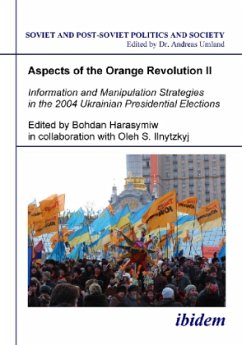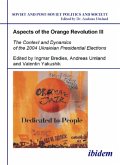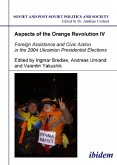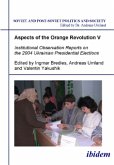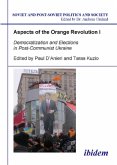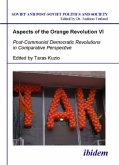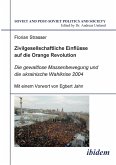In Ukraines presidential elections of 2004, the establishment candidate Viktor Yanukovych had the advantages of a solid regional base, access to administrative resources, dominance in the media, help by Russian spin-doctors, and support of Moscow. Yet the winner was the pro-Western challenger, Viktor Yushchenko. How did Ukrainian voters break through the barrage of propaganda so as to deliver their ultimate verdict? Was the divide between Eastern and Western Ukraine fact or PR fiction?
In this volume, scholars from two continents examine various aspects of the elections that turned into the Orange Revolution focusing on electoral campaigns and attempts to manipulate results. Following the editors scene-setting chapter which looks at the electoral laws and their consequences in the previous decades elections, presidential and parliamentary, the contributors take up specific features of the 2004 contest. The critical part played by a single independent television channel is analyzed by Marta Dyczok. Ilya Khineyko reviews the coverage of the elections in the Russian press, favourable to Yanukovych and always looking for parallels between Russia and Ukraine as well as keeping in mind Moscowsinterests. The myths and stereotypes of the campaign are taken up in two contributions by Lyudmyla Pavlyuk and Olena Yatsunska. Clearly, constructed images often overshadowed real issues. Valerii Polkonskys essay exposes the linguistic innovations of the campaign, including the irony and humour unleashed by such incidents as the egg attack on Yanukovych. In Kerstin Zimmers final paper, the machine politics, administrative resources and fraud which had worked so well in Donetsk are shown to have been less than successful on the national level for reasons of scale and impersonality.
In this volume, scholars from two continents examine various aspects of the elections that turned into the Orange Revolution focusing on electoral campaigns and attempts to manipulate results. Following the editors scene-setting chapter which looks at the electoral laws and their consequences in the previous decades elections, presidential and parliamentary, the contributors take up specific features of the 2004 contest. The critical part played by a single independent television channel is analyzed by Marta Dyczok. Ilya Khineyko reviews the coverage of the elections in the Russian press, favourable to Yanukovych and always looking for parallels between Russia and Ukraine as well as keeping in mind Moscowsinterests. The myths and stereotypes of the campaign are taken up in two contributions by Lyudmyla Pavlyuk and Olena Yatsunska. Clearly, constructed images often overshadowed real issues. Valerii Polkonskys essay exposes the linguistic innovations of the campaign, including the irony and humour unleashed by such incidents as the egg attack on Yanukovych. In Kerstin Zimmers final paper, the machine politics, administrative resources and fraud which had worked so well in Donetsk are shown to have been less than successful on the national level for reasons of scale and impersonality.

